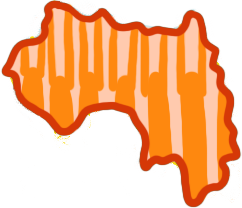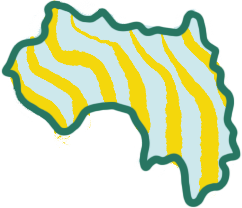Text
Thus far, we have covered a ton of ways to speak about yourself as well as the people and things in your life and surroundings. But we have not seen a single Maninka verb!
(NOTE: Yes, we saw qualitative "verbs" earlier but they are nothing like the "normal" verbs, we'll cover here.)
In this chapter, we'll finally get into them so you can say things like "I am from America", "I don't speak French", "I am not going".
In English, we say that such sentences are in the "present" tense. In Maninka, and Manding in general, linguists tend to say they are "imperfective", which basically means "incomplete." Use whichever one helps you remember best!
Specifically, I'll cover how to use verbs in the present tense in the following forms:
- intransitively (e.g., "I go")
- negative intransitively (e.g., "I don't go")
- transitively (e.g., "I speak Maninka)")
(NOTE: This chapter uses a decent amount of technical grammar vocabulary. If you are overwhelmed, try these tips.)
Intransitively
A sentence is intransitive if it has no direct object. For instance, something like "You talk", "I sleep" or "I go" in English.
Let's build a similar sentence in Maninka with the verb wa 'go' and the subject n 'I':
N ye wala
'I go'
The additional word ye looks like something that we already encountered, but it's actually a distinct word. The first ye that we encountered was the copula of situative sentences such as:
N ye Kankan.
'I am (located) in Kankan.'
The ye in N ye wala is historically related, but distinct. It has nothing to do with location. Instead, it is an auxiliary or helper word (linguists often call it a predicate marker) that allows us to use a verb in the present (or "imperfective") tense. To be used properly, however, it also requires that we add the inflectional suffix -la to the verb.
How about I write it out with an additional dash and some explicit glossing? For example:
N ye wa**-la**
I PRESENT go**-PRESENT**'I go'
We can easily change the meaning of sentence by swapping out the verb. For instance, let's do so with the verb kuma ('speak; talk'):
N ye kumala
'I speak'
As you can see, the structure for building an imperfective intransitive sentence is thus as follows:
SUBJECT +
ye+ VERB-la
This word order is fixed; you will never see the SUBJECT, ye or the VERB (with -la) in a different order:
N wala yeEtc.
Moreover, there are no different "conjugations" to apply depending on the subject like in English, French or Spanish. Everything remains the same:
N ye wala = I go I ye wala = You go À ye wala = He/she goes ...
Etc.
Sound changes
That said, there are two possible sound changes that you may encounter.
First, the word ye may sound like ɲe if it is preceded by a word that ends with nasalization (e.g., den 'child'). For instance:
Den ye wala → [Den ɲe wala]
'The child goes'
(NOTE: In this course, I will not write out this sound change. But you may encounter it in other Maninka texts that use Latin-based orthography, so you should be aware that it exists.)
Second, the inflectional suffix -la becomes -na if the verb that it attaches to ends in nasalization (e.g., don 'enter'):
N ye donna
'I enter'
The change from -la to -na also often occurs if the last consonant of the verb is a nasal one (i.e., n or ɲ). For example:
Sara ye nana yan
'Sara comes here'
(as in, "Sara is coming here" [see below for detail on this])
Present (Progressive)
Thus far, I have simplified things by treating SUBJECT ye VERB-la as being simply the equivalent of a "present simple" tense construction in English (e.g., "I go").
In reality, sentences built in this way often line up better in translation with English progressives (e.g., "I am going"), which are sometimes referred to as the "present continuous" tense. For instance:
N ye wala
'I am going'
(or, "I go")
Or:
Adama ye kumala
'Adama is speaking'
(or, "Adama speaks")
Structurally, you can see Maninka imperfectives and English present progressives line up quite well too:
Adama ye kumala
'Adama is speaking'
While this parallel can be helpful, it's important to note that the exact translation of a Maninka imperfective construction with ... ye VERB-la will depend on the context; it can either be the "present simple" ("I go") or the "present continuous" ("I am going").
For instance:
Sila ye wala Kankan
'The road goes to Kankan'
(This sentence would sound off to me in English as 'The road is going to Kankan')
With this in mind, how could we say something like, "I am from America"? Well, we start with the verb bɔ (or ka bɔ in citation form; see below), which literally means something like 'exit; come out of' or sortir if you are familiar with French. Now we can say the following:
N ye bɔla Ameriki.
I PRESENT come.out.ofPRESENT America'I am from America.'
(NOTE: N ye bɔla Ameriki is an intransitive sentence despite the presence of Ameriki. As you will see below, direct objects appear before verbs!)
(NOTE: Maninka speakers also tend to express the idea of where they come from using the resultative participle suffix -nɛn. Without going into the details here, don't be surprised if people say I bɔnɛn min? [lit. 'You came.out.of where?'] instead of I ye bɔla min?].)
Negative intransitive
To make an imperfective sentence negative, all we need to do is replace ye with a word that looks like many other negation words that we've seen: tɛ.
For instance:
N tɛ wala
I PRESENT.NEG go-PRESENT"I don't go/leave"
OR
"I am not going/leaving"
Or:
Àlu tɛ bɔla Faransi
They PRESENT.NEG come.out.of-PRESENT France"They aren't from France." (lit. "They don't come out of France" or "They are not exiting France")
Transitive
If you'd like to build a sentence or use a verb that requires a direct object (that is, a verb that is transitive), the same rules apply, but you'll need to insert the direct object between the predicate marker (or "auxiliary") ye or tɛ and the verb.
For instance:
N ye maninkakan fɔla.
I PRESENT Maninka say-PRESENT'I speak Maninka.'
Or:
Kadija ye ji minna.
Kadija PRESENT water drinks-PRESENT'Kadija drinks water'
OR
'Kadija is drinking water'
To make things negative, you keep the same structure, but switch ye to tɛ:
Sara tɛ tubabukan mɛnna
Sara PRESENT.NEG French hear-PRESENT'Sara doesn't understand French'
Or:
I tɛ mɔɔ fola. You PRESENT.NEG people greet-PRESENT
"You don't greet people"
(as in, "You don't say hi [and therefore aren't respectful of others]")
(NOTE: As you can see, direct objects appear before verbs. This is why the sentence N ye bɔla Ameriki is intransitive. We cannot say N ye Ameriki bɔla
Citation form and the infinitive marker ka
Now that you have finally been introduced to verbs, we need to also take a step back to look at how people talk about verbs. Let me explain.
When people speak, Maninka verbs—like those of English—are typically given in a specific citation form that includes the infinitive marker ka.
This is almost identical to the way in English, we cite verbs using the helper word "to": e.g., "to exit", "to speak", etc. For instance:
– How do you say "to go" in Maninka?
– 'Ka wa'
Or if you were asking from Bambara into English:
– "Ka wa" kɔdɔ ko di?
– 'To go'
The one difference is that in Maninka, citation forms can differentiate between intransitive usage (that is, without a direct object, e.g., "to go") and transitive usage (that is, with a direct object; e.g., "to say something").
If a verb is intransitive then the citation form is ka + VERB. For instance:
ka wa
'to go'
If a verb is transitive then the citation form is k'à + VERB. This comes from the fuller ka à + VERB, where ka is the infinitive marker and à ('it') stands in for direct object. For instance:
k'à fɔ
'to say something'
Later in your Maninka studies, you'll see why this distinction is important. For now, let's just say that you should learn your verb vocab in citation form using ka or k'à so that you know whether a verb is typically used intransitively or transitively.
The habitual/future marker di
This chapter is about the so-called "present" tense. But Maninka and English are quite different.
As you've just seen, the present tense with SUBJECT ye/tɛ VERB-la constructions can translated as both the present simple ("I go") and the present continuous ("I am going") in English.
There however is another tense in Maninka that often can be translated into the "present simple" in English.
It involves the use of the predicate marker di, which marks both the "habitual" and the "future" in Maninka.
This habitual tense is one of the reasons that sentences in the present with ye ... VERB-la often seem to be closer to English's present continuous tense.
Let me show you how it works. It's similar to what you have just learned but a bit simpler even.
For example, let's build a sentence and interpret as being the habitual present:
N di wa Kankan
'I go to Kankan'
(as in, "I regularly/habitually go to Kankan")
Or:
Adama di maninkakan karan
'Adama studies Maninka'
(as in, "Adama regularly/habitually studies Maninka")
As you can see dioccupies the same slot as ye. This is the case with all predicate markers.
And there is no need for anything like -la/na that attaches to the verb. That only happens with present tense constructions with ye.
The basic translation of the sentences appears to simply be the present tense, but what's particular is that di encodes an idea of habit or regularity. That is what distinguishes it form constructions with ye ... -la.
What's tricky though is that di is also used for the future!
For instance, our previous example could also be interpreted as such if the context were right:
N di wa Kankan
'I will go to Kankan'
(or, "I am gonna go to Kankan")
Or:
Adama di sobo san
'Adama will buy meat'
(or, "Adama is gonna buy meat")
To make a habitual/future tense construction negative, all you need to do is replace di with tɛ. For instance:
N tɛ wa Kankan
"I don't go to Kankan (regularly)"
OR
"I will not go to Kankan" / "I am not gonna go to Kankan"
"To Like", "To Have" and "To Want"?
In this chapter, I've introduced a few verbs and you'll learn more in the vocab list below.
You'll notice that you will not see some of the most common English language verbs:
- to like
- to have
- to want
Why not?
This is because none of these things are expressed with normal verbs in Maninka (or Manding in general). Instead, they are represented by constructions that literally translate into things like the following:
- "It is pleasing to me" → to like
- "It is on my hand" → to have
- "I am beside it" → to want
Don't worry! The actual constructions in Maninka aren't that complicated and you'll get there soon enough.
(NOTE: If you can't wait and want to take a peek, check out the more advanced Bambara/Jula Grammar chapters for "To Like" or "To Have".)
Summary
Ayiwa! We covered the following:
-
Imperfective or "present tense" sentences use the following structure:
SUJ + ye/tɛ + (DIR.OBJ) + VERB-la/na-
Intransitively
SUJ + ye/tɛ + VERB-la/na -
Transitively
SUJ + ye/tɛ + DIR.OBJ + VERB-la/na
-
-
We can ask or say where we are from using the verb
ka bɔ('to exit'):*N ye bɔla Ameriki*
'I am from America'
(lit. 'I come out of America')
-
We use the verbs
k'à fɔ('to say something') andk'à mɛn('to hear something') to express the ideas of speaking and understanding a language, respectively.For instance:
*I ye anglais-kan fɔla ba?*
'Do you speak English?'
(lit. 'Do you say English?')
Or:
Musa fa tɛ maninkakan mɛnna
'Musa's father doesn't understand Maninka'
(lit. 'Musa's father doesn't hear Maninka')
-
Maninka verbs are given in citation form using the infinitive marker
ka- Intransitive:
ka + VERB(e.g.,ka wa'to go') - Transitive:
k'à + VERB(e.g.,k'à fɔ'to say something' ['to say it'] orka mɔɔ fo'to greet someone' [lit. 'to greet a person'])
- Intransitive:
-
The habitual/future tense is expressed with the predicate marker
di:N di wa
'I go (regularly)' / 'I will go' / 'I am going to go'
Or:
Adama di sobo san
'Adama buys meat (regularly)' / 'Adama will buy meat'
-
To make the habitual/future tense negative, simply switch
ditotɛ:N tɛ wa
"I do not go (regularly)" / 'I will not go'
Vocab
Coming soon n'Ala sɔnna!
- k'à fɔ
- to say something; to speak a language
- k'à mɛn
- to hear something; to understand a language
- k'à faamun
- to understand something
- ka bɔ
- to exit; come out of; be from
- ka taa/taga
- to go/leave [Maninka/Bambara]
- ka wa
- to go/leave [Maninka]
- ka kuma
- to talk; speak
- angilɛkan/anglais-kan
- English
- maninkakan
- Maninka (language)
- tubabukan
- French (language)
- ka na
- to come
- k'à san
- to buy something
- ka
- infinitive marker
- Kodiwari
- Côte d'Ivoire
- Ameriki
- America; USA
- Faransi
- France
- ka ban
- to end
- kaban
- already
- ka se
-
to arrive; to be able to
- Ala y'à ɲuman se!
- May God make him/her arrive properly!
- sunɔɔ
- sleep; sleepiness
- k'à yida
- to show something
- Ala ye sinin yida an na!
- May God show us tomorrow!
- ka baara kɛ
- to work (lit. 'to do work') [Bambara]
- ka baara
- to work [Maninka]
- k'à kɛ
- to do/make something
- ka sɛnɛ kɛ
- to farm (lit. 'to do farming')
- k'à sɛnɛ
- to farm something
- ka nkɔni fɔ
- to play the ngoni
- ka dɔnkili la
- to sing (lit. 'to lay down a song')
- k'à damun/domu
- to eat something
- ka damunni/domuni kɛ
- to eat (lit. 'to do food')
- k'à min
- to drink something
- k'à fo
- to greet/thank someone
- ka foli kɛ
- to greet/thank (lit. 'to do greeting')
- konin
- in any case; but
- ka bon lɔ
- to erect/build a house
- ka nisi gbɛn
- to herd cows (lit. 'to chase cow')
- ka jese la
- to weave (lit. 'to create thread')
- ka jɛɛ mina/mida
- to fish (lit. 'to grab fish')
- ka wili/wuli
- to rise; get up
- ka don
- to enter
- k'à feere
- to sell something
- k'à karan
- to read/study something
- karan
- reading; studies
- k'à sɛbɛ
- to write something
- ka sii
- to sit
Vocab list will be here someday!
Flashcards will be here someday!
Exercises
Exercises will be here someday!




